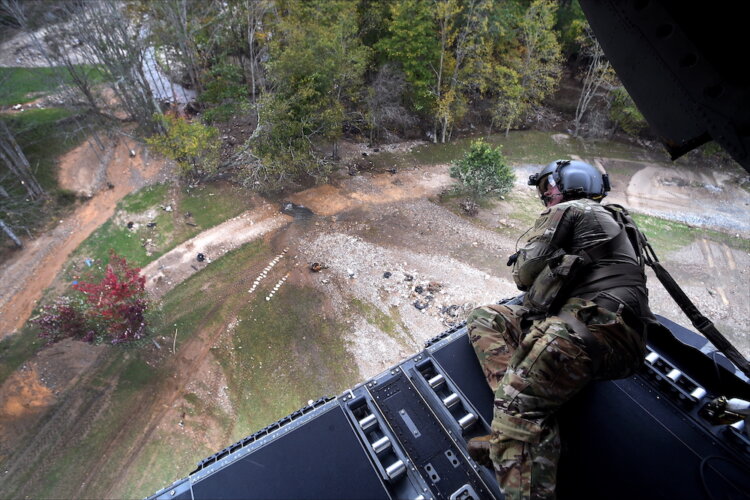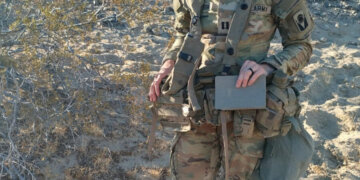Col. Kimberly Graham said her pride in her state has never been greater. She has witnessed the strength and unwavering resolve of residents who continue to push through the aftermath of Hurricane Helene’s devastation in Western North Carolina.
“I think you saw it in the early days after the hurricane hit, people banded together and started helping their own,” said Graham, who serves as the officer in charge of all relief operations in the region. “That’s just the North Carolina way. We don’t have a problem stepping in and supporting our neighbors.”
At the height of the response, Graham, from the 60th Troop Command, was one of 3,500 National Guard soldiers and airmen activated, bolstered by assistance from at least five other states. Now, with recovery efforts ongoing, that number has been reduced to approximately 500 North Carolina National Guard members who remain embedded in the most heavily affected areas, intensely focused on addressing their assigned priorities.
One of those areas is Buncombe County, home to the city of Asheville, where intense winds and rain downed trees and power lines, houses were washed away in floodwaters, and roads and bridges were destroyed.
Asheville’s water system suffered catastrophic damage, says resident Courtney Jones. Her family still doesn’t have potable water, forcing them and other community members to rely on the community care and water distribution sites manned by the National Guard and other partners. These efforts have been vital in helping her family navigate daily life for basic needs like food preparation and hygiene.
RELATED: North Carolina-based Army Reserve engineers support Hurricane Helene’s emergency efforts
“They’ve really just become part of our community, just helping with anything that they can help with,” Jones said of the National Guard members.
Jones teaches eighth-grade mathematics at A.C. Reynolds Middle School, which served as a hub for Guard members to shelter and sleep in the initial weeks of the hurricane relief efforts. Now, with classes back in session, it is a hopeful sign that life is gradually returning to a semblance of normalcy, though it is riddled with imperfections.
Day-to-day relief operations have been tailored to the unique needs of each community, noted Graham. While Asheville and other areas are struggling with crippled water systems, other regions face challenges just reaching isolated communities, impacting residents and businesses in distinct ways.
“You go up in some of your higher elevations and areas where Christmas tree farming is a big part of the economy, their challenges are road access and making sure the roads that go into these farms are still accessible by big equipment,” explained Graham.
Many areas remain reachable only by foot or ATVs, underscoring the continued need for forestry teams on the ground. Engineers are working tirelessly to install culvert systems to re-establish the integrity of the roads that have been washed out. Resourcing communities is also happening on a larger scale for businesses and facilities like daycares, said Capt. Darlene Girardeau. Her team manages a warehouse inventory of water and other critical supplies.
Girardeau, who lives in the southeastern part of the state and serves as the commander for the 1452nd Combat HET Transportation Company, volunteered for activation in the wake of Hurricane Helene. While the operational tempo in the western region has slowed down since she arrived in mid-October, she notes that the road to recovery remains long and demanding.
“At the end of the day, we’re here until that mission is complete,” said Girardeau. “We definitely have soldiers who are happy to extend their orders to ensure that our communities are taken care of. I am one of them.”
It is hard to put a timeline on the demobilization efforts, added Graham, due to the varied and complex nature of the region’s needs. The refortification of roads and bridges will take time. Equally crucial is ensuring that cities and counties are prepared for the transition — knowing when and how to take over the essential support that the National Guard has been providing, whether through local services, external partners, or their own means.
“It’s instance by instance, county by county, city by city,” said Graham of the long-term recovery outlook. “Because some of them have very unique needs or differing needs from one another.”
Jones agreed recovery for her community will be a continuous process and they will feel the effects of Helene for years to come. In her school district alone, hundreds of families remain displaced due to the hurricane’s destruction. And once a lively tourist hub, parts of the town will need significant time and resources to recover before they can welcome visitors again, she said.
When potable water is finally restored, she and her neighbors will no longer need to visit community care stations for basic needs like showers, laundry, and water pick-ups, signaling a reduced reliance on the National Guard’s presence. Although their departure will be bittersweet, it will mark an important step forward — a sign families in the area are on the path to reclaiming the lives they led before the storm.
Read comments
















































